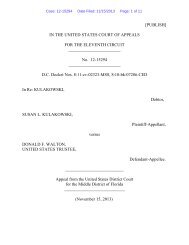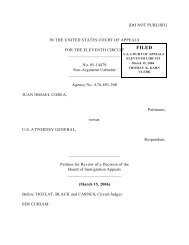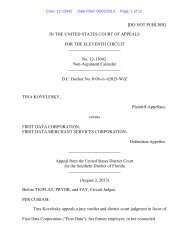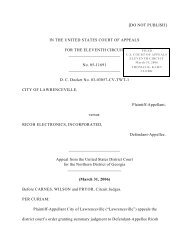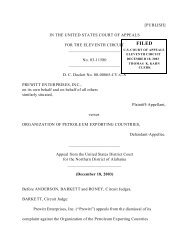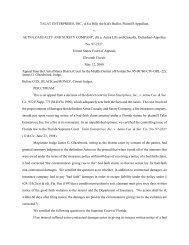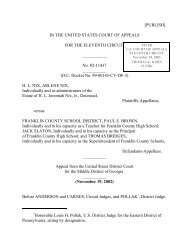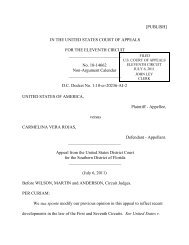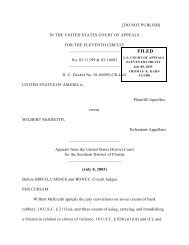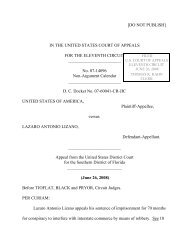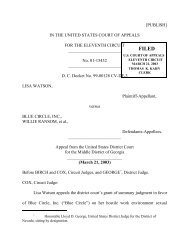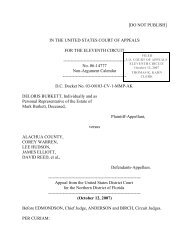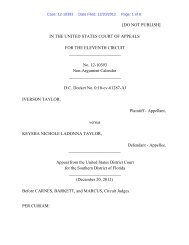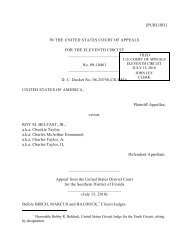Jesus Alfonso Ferrer Marcano v. U.S. Atty. Gen - Court of Appeals ...
Jesus Alfonso Ferrer Marcano v. U.S. Atty. Gen - Court of Appeals ...
Jesus Alfonso Ferrer Marcano v. U.S. Atty. Gen - Court of Appeals ...
You also want an ePaper? Increase the reach of your titles
YUMPU automatically turns print PDFs into web optimized ePapers that Google loves.
IN THE UNITED STATES COURT OF APPEALS<br />
FOR THE ELEVENTH CIRCUIT<br />
________________________<br />
No. 08-13609<br />
Non-Argument Calendar<br />
________________________<br />
Agency Nos. A99-550-276<br />
A99-547-998<br />
JESUS ALFONSO FERRER MARCANO,<br />
PATRICIA MYRIAM UROSA URDANETA,<br />
U.S. ATTORNEY GENERAL,<br />
versus<br />
________________________<br />
Petition for Review <strong>of</strong> a Decision <strong>of</strong> the<br />
Board <strong>of</strong> Immigration <strong>Appeals</strong><br />
_________________________<br />
(February 27, 2009)<br />
Before TJOFLAT, BIRCH and DUBINA, Circuit Judges.<br />
PER CURIAM:<br />
[DO NOT PUBLISH]<br />
FILED<br />
U.S. COURT OF APPEALS<br />
ELEVENTH CIRCUIT<br />
FEB 27, 2009<br />
THOMAS K. KAHN<br />
CLERK<br />
Petitioners,<br />
Respondent.
<strong>Jesus</strong> <strong>Alfonso</strong> <strong>Ferrer</strong> <strong>Marcano</strong> (“<strong>Ferrer</strong>”), on behalf <strong>of</strong> himself and his wife,<br />
Patricia Myriam Urosa Urdaneta (“Urosa”), petitions us for review <strong>of</strong> a final order<br />
by the Board <strong>of</strong> Immigration <strong>Appeals</strong> (“BIA”) affirming the Immigration Judge’s<br />
(“IJ”) denial <strong>of</strong> his claims for asylum and withholding <strong>of</strong> removal. The BIA<br />
agreed with the IJ’s adverse credibility finding and her determination that <strong>Marcano</strong><br />
failed to provide sufficient additional evidence to show his eligibility for asylum or<br />
withholding <strong>of</strong> removal. Based on our review <strong>of</strong> the record, we DENY the<br />
petition.<br />
I. BACKGROUND<br />
<strong>Ferrer</strong> and Urosa, both <strong>of</strong> whom are natives and citizens <strong>of</strong> Venezuela,<br />
arrived in the United States in July 2005, as non-immigrants with permission to<br />
remain until January 2006. Administrative Record (“AR”) at 492. On 6 February<br />
2006, the Department <strong>of</strong> Homeland Security (“DHS”) issued both <strong>of</strong> them Notices<br />
to Appear (“NTA”), charging that they were subject to removal under 8 U.S.C. §<br />
1227(a)(1)(B), INA § 237(a)(1)(B), as aliens had who remained in the United<br />
States for a time longer than permitted. Id. at 506. At an initial removal hearing in<br />
June 2006, <strong>Ferrer</strong> admitted the allegations contained in the NTA and conceded<br />
removability. Id. at 73.<br />
In December 2005, <strong>Ferrer</strong> applied for asylum and withholding <strong>of</strong> removal<br />
2
1<br />
based on political opinion. Id. at 391, 395, 399. In his application, he identified<br />
only one past employer, Metro de Maracaibo (“Metro”), where he had claimed to<br />
have worked as an internal auditor from December 2001 to October 2004. Id. at<br />
394. In his application, he noted that he had been an active member <strong>of</strong> COPEI, the<br />
2<br />
Social Christian Party in Venezuela, since 1995. Id. at 396, 402. He also asserted<br />
a fear <strong>of</strong> being tortured or killed if he returned to Venezuela. Id. at 395.<br />
<strong>Ferrer</strong> attached a statement to his application in which he discussed the basis<br />
for his asylum claim. Id. at 402–06. He identified himself as a longstanding<br />
opponent <strong>of</strong> Hugo Chavez, the President <strong>of</strong> Venezuela. Id. at 402. He expressed<br />
this opposition first by joining the COPEI Revolutionary Youth Group and later by<br />
actively participating in marches, campaigns and other collaborative efforts<br />
protesting against Chavez. Id. <strong>Ferrer</strong> described how in late 2004, the Venezuelan<br />
government became the largest shareholder in Metro and instituted a number <strong>of</strong><br />
personnel changes, including appointing to positions <strong>of</strong> authority those<br />
sympathetic to Chavez. In addition, the Division <strong>of</strong> Intelligence and Police<br />
Investigation Service (DISIP) began to investigate those who, like <strong>Ferrer</strong>, had<br />
signed a referendum to revoke Chavez’s presidential mandate or were otherwise<br />
1<br />
He also applied for relief under the United Nations Convention Against Torture and Other<br />
Cruel, Inhuman and Degrading Treatment or Punishment (“CAT”). Id. at 395. The IJ denied this<br />
relief and he did not appeal this decision to either the BIA or us.<br />
2<br />
He spelled it Copey in the application.<br />
3
elieved to be opposed to him. Id. at 402–03.<br />
<strong>Ferrer</strong> further stated that, shortly after these investigations commenced, he<br />
and his superior, Nancy Peña, observed company funds being diverted to political<br />
campaigns. Id. at 403. They composed a report discussing these abuses but never<br />
published it because Peña was fired before it could be completed. Id. In July<br />
2004, <strong>Ferrer</strong> claimed to have received threats from various DISIP <strong>of</strong>ficers, in<br />
response to which he began to participate in meetings with those advising Manuel<br />
Rosales, the governor <strong>of</strong> Zulia, the state in which Maricaibo is located, who<br />
opposed Chavez. Id. Later that month, an unknown individual called Urosa and<br />
threatened to harm <strong>Ferrer</strong> if he did not stop opposing Chavez. Id. Despite this<br />
warning, <strong>Ferrer</strong> continued to participate in opposition activities, including<br />
campaigning for Rosales. Id. at 404.<br />
<strong>Ferrer</strong> also noted that, at some point in October 2004, Metro <strong>of</strong>ficials asked<br />
him to endorse their illegal disbursements or to resign. Id. He declined to do<br />
either, so they had DISIP <strong>of</strong>ficers bar him from reentering the building. Id. <strong>Ferrer</strong><br />
unsuccessfully tried to oppose his firing. Id. at 405. Shortly thereafter, he began to<br />
receive ominous phone calls and was followed by a white Ford Explorer, in<br />
response to which he and his wife moved to the home <strong>of</strong> a friend. Id. On 16<br />
January 2005, he was caught by three DISIP <strong>of</strong>ficers, put into a white Ford<br />
Explorer, taken into the woods with a hood over his head, beaten, and left by the<br />
4
side <strong>of</strong> the road. Id. After this incident, he and his wife moved to Caracas to live<br />
with another friend. Id. Two months later, that friend began to receive threatening<br />
phone calls regarding his harboring <strong>of</strong> <strong>Ferrer</strong>. Id. After learning <strong>of</strong> these calls,<br />
<strong>Ferrer</strong> felt he had no choice but to leave the country. Id. at 406. He applied for a<br />
visa and left for the United States on 15 July 2005. Id.<br />
<strong>Ferrer</strong> attached a number <strong>of</strong> exhibits to his application, including medical<br />
and police reports discussing the 16 January 2005 beating and <strong>Ferrer</strong>’s injuries, a<br />
document noting his membership in COPEI since 1995, and a statement from<br />
Nancy Peña, whose recollection <strong>of</strong> the events at Metro corresponded to the details<br />
in <strong>Ferrer</strong>’s statement. Id. at 470, 473, 475, 479, 481. He also provided a copy <strong>of</strong><br />
the United States Department <strong>of</strong> State’s 2006 Country Report on Human Rights<br />
Practices in Venezuela. Id. at 145. According to this report, there had been<br />
harassment <strong>of</strong> political opposition during 2006. Id. In particular, the report<br />
discussed how the government had compiled a list, termed the “Tascon List,” <strong>of</strong> all<br />
those who had signed petitions opposing Chavez. Id. at 150. The government then<br />
harassed or fired those on the list who were also government employees. Id.<br />
<strong>Ferrer</strong> also included an affidavit from his mother-in-law, who stated that<br />
<strong>Ferrer</strong> and his wife had been persecuted and threatened physically because <strong>of</strong> their<br />
political opinions and that their lives might be imperiled if forced to return to<br />
Venezuela. Id. at 418–20. She also noted that she had and the rest <strong>of</strong> her family<br />
5
had likewise experienced persecution because <strong>of</strong> <strong>Ferrer</strong>’s beliefs, most notably<br />
when people attempted to murder her son, Andres Fernando Urosa Urdaneta<br />
(“Andres”), in June 2006 when he was driving an automobile registered in <strong>Ferrer</strong>’s<br />
name. Id. at 418–19.<br />
<strong>Ferrer</strong>’s other attachments confirmed this incident. Andres, in an affidavit,<br />
asserted that the shooting was really an assassination attempt on <strong>Ferrer</strong> perpetrated<br />
by followers <strong>of</strong> Chavez. Id. at 308. He based this conclusion on three facts: his<br />
close resemblance to <strong>Ferrer</strong>, his encounters shortly before the incident with various<br />
individuals who expressed a belief that <strong>Ferrer</strong> had returned, and the assailants<br />
yelling “You came back” as they shot him. Id. at 308–09. <strong>Ferrer</strong> also included<br />
various police and court documents about the shooting, as well as photographs<br />
showing the damage to the car. Id. at 266, 268, 274–78, 299. These documents<br />
confirmed that Andres owned a gray Ford sedan, which <strong>Ferrer</strong> had previously<br />
owned, and that a bullet hit the car while Andres was driving it on 2 June 2006. Id.<br />
at 266, 268, 274. The police report concluded that the shooting was targeted at<br />
<strong>Ferrer</strong>, not Andres, because <strong>of</strong> the resemblance <strong>of</strong> the two, <strong>Ferrer</strong>’s prior ownership<br />
<strong>of</strong> the car, and Andres’ claim that, before the shooting, the attackers screamed<br />
“You returned . . . we’re gonna kill you and your wife . . . <strong>Jesus</strong>.” Id. at 299.<br />
<strong>Ferrer</strong> testified at his 26 March 2007 removal hearing. Id. at 78. He<br />
affirmed that his application was accurate and contained all information important<br />
6
to his removal claim. Id. at 83. He stated that he had been persecuted by the<br />
Bolivarian Circles (“the Circles”), a group <strong>of</strong> Chavez’s followers who persecuted<br />
enemies <strong>of</strong> the revolution, because <strong>of</strong> his political activity. Id. at 85. This political<br />
activity included participating in COPEI, for which he claimed to have been the<br />
first vice president for the youth. Id. at 85–86. He indicated that he first drew the<br />
ire <strong>of</strong> the Circles in July 2004 when, as an auditor at Metro, he refused requests to<br />
siphon money to various political campaigns associated with Chavez. Id. at 91.<br />
The Circles responded to his refusal by informing him that they knew he was a<br />
member <strong>of</strong> COPEI and had supported various attempts to reduce Chavez’s power.<br />
Id. at 92. He also noted that he had been placed on the Tascon List because <strong>of</strong> his<br />
support for revoking Chavez’s referendum. Id. at 93. Around the same time, he<br />
and his wife received a number <strong>of</strong> threatening phone calls which <strong>Ferrer</strong> believed to<br />
be from the Circles and led him to move to the house <strong>of</strong> a friend. Id. at 92–94.<br />
<strong>Ferrer</strong> also recounted the 15 January 2005 kidnapping and events thereafter.<br />
He stated that he was kidnapped by three individuals in a white Ford Explorer, the<br />
same van used by DICIP and the Circles. Id. at 95. These assailants beat him in<br />
the face, stomach and legs, leading to a broken nose and bruises on his right leg<br />
and left eye. Id. at 95–97. He was subsequently released with the admonition that<br />
this was his last warning and that he should “stay away” and “stop bugging their<br />
lives” or they would kill him because he was “a squalid.” Id. at 96. Because <strong>of</strong><br />
7
this incident, he and his wife went to live with Carlos Alberto Rincon, a friend in<br />
Caracas on 20 January 2005. Id. at 97. On 17 February 2005, Rincon received a<br />
phone call in which the speaker asserted that he knew <strong>Ferrer</strong> was living there, that<br />
<strong>Ferrer</strong> was an opponent <strong>of</strong> the revolution, and that Rincon would be deemed an<br />
opponent as well if he let <strong>Ferrer</strong> stay there. Id. at 98. Based on this threat, Rincon<br />
asked <strong>Ferrer</strong> to leave the house. Id. <strong>Ferrer</strong> then moved in with a different friend in<br />
Caracas before coming to the United States in July 2005. Id. at 98–99.<br />
<strong>Ferrer</strong> also discussed events since his departure. He asserted that the attempt<br />
on Andres was actually against him because the Circles had been asking family<br />
members to see <strong>Ferrer</strong> in the days leading up to the incident and the assailants had<br />
stated “You came back . . . <strong>Jesus</strong>.” Id. at 101. He also noted that family members<br />
had received threatening phone calls from individuals who had discovered that<br />
<strong>Ferrer</strong> continued to participate in anti-Chavez activities in the United States. Id. at<br />
102–03. Because <strong>of</strong> these phone calls, family members had urged him not to<br />
return to Venezuela, and <strong>Ferrer</strong> feared losing his life if he returned. Id. at 103.<br />
On cross-examination, <strong>Ferrer</strong> admitted that the affidavit he submitted from<br />
COPEI <strong>of</strong>ficials identified him only as a member <strong>of</strong> the organization, not as a vice<br />
president, and that the only pro<strong>of</strong> he had <strong>of</strong> being vice president came from family<br />
members’ affidavits. Id. at 104–05, 112. He also acknowledged that he had no<br />
pro<strong>of</strong> <strong>of</strong> his employment with Metro or <strong>of</strong> the veracity <strong>of</strong> his description <strong>of</strong> his<br />
8
time there other than the affidavit from Nancy Peña, though he claimed that he was<br />
unable to provide an employment card because it had been taken away from him<br />
when he was fired. Id. at 105–06. He noted that he was able to get police reports<br />
about the incidents involving himself and Andres because the police were part <strong>of</strong><br />
the government <strong>of</strong> Zulia, which is in opposition to Chavez. Id. at 106–07. <strong>Ferrer</strong><br />
also confirmed that Andres’ initial statement about the shooting did not mention<br />
the assailants referring to <strong>Ferrer</strong>. Id. at 112.<br />
After the completion <strong>of</strong> the cross-examination, the IJ questioned <strong>Ferrer</strong>. In<br />
response to her questions, <strong>Ferrer</strong> stated that he worked at the state bidding<br />
commission in Zulia from October 2004 to January 2006. Id. at 122, 125–26. The<br />
bidding commission, whose members were selected and trusted by Governor<br />
Rosales, analyzed public works projects. Id. at 122, 125–28. <strong>Ferrer</strong> had no pro<strong>of</strong><br />
<strong>of</strong> this employment because <strong>of</strong> the hurried manner in which he had to leave<br />
Maracaibo after the kidnapping. Id. at 129. <strong>Ferrer</strong> explained that he did not<br />
mention this employment on his asylum application because he thought that he<br />
needed to discuss only that employment relevant to the events upon which he<br />
based his persecution claim. Id.<br />
The IJ also asked <strong>Ferrer</strong> about the causes for the various incidents he<br />
recounted. <strong>Ferrer</strong> claimed that he received the July 2004 and November 2004<br />
threatening phone calls because <strong>of</strong> his refusal to misappropriate Metro funds. Id. at<br />
9
130. He stated that he was kidnapped and beaten because Governor Rosales had<br />
asked him to be part <strong>of</strong> a public announcement reporting on the problems at Metro.<br />
Id. at 131–34. Chavez’s supporters were aware <strong>of</strong> his plan to participate because<br />
they had intercepted his phone calls. Id. at 132–34. <strong>Ferrer</strong> said that he did not<br />
mention any <strong>of</strong> this in his application because the application preparer requested<br />
concrete facts and did not request an extended version <strong>of</strong> his story. Id. at 135.<br />
The IJ issued an oral decision denying his applications for asylum,<br />
3<br />
withholding <strong>of</strong> removal, or CAT relief. Id. at 68. She found <strong>Ferrer</strong> not to be<br />
credible based on a number <strong>of</strong> inconsistencies between his testimony and his<br />
application. Id. at 57–61. She particularly focused on inconsistencies regarding<br />
<strong>Ferrer</strong>’s employment with the bidding commission and the rationale for his<br />
kidnapping. Id. at 57–59. His application did not mention this employment at all,<br />
whereas he testified that the kidnappers targeted him because <strong>of</strong> his activities in<br />
connection with Rosales and the bidding commission. Id. at 58–60. The IJ also<br />
found inconsistencies regarding his role in COPEI, namely whether he was a vice<br />
president <strong>of</strong> COPEI’s youth group or merely a member. Id. at 60–61.<br />
In addition to making an adverse credibility finding, the IJ determined that<br />
<strong>Ferrer</strong> had not provided sufficient evidence to show past persecution or a well-<br />
3 In the course <strong>of</strong> the IJ’s opinion, she made a number <strong>of</strong> factual errors. In particular, she<br />
misstated several dates for events, such as <strong>Ferrer</strong>’s period <strong>of</strong> employment with the bidding<br />
commission, when he was kidnapped, and when he fled to the United States. Id. at 50–53.<br />
10
founded fear <strong>of</strong> future persecution based on political opinion. Id. at 61. She<br />
thought that <strong>Ferrer</strong> based his application on his employment with Metro and with<br />
the bidding commission and found there to have been no objective evidence <strong>of</strong><br />
either in the record. Id. at 61–62. She also found no objective evidence <strong>of</strong> his<br />
being a vice president in COPEI. Id. at 62–63. As to the alleged assassination<br />
attempt, she focused on Andres’ contradictory statements about what was said at<br />
the time <strong>of</strong> the shooting and concluded that there was no objective evidence that<br />
<strong>Ferrer</strong> was the target. Id. at 63–64. The IJ also determined that <strong>Ferrer</strong>’s statements<br />
about the threats against him lacked the detail necessary to determine why he had<br />
been targeted, and that it was unlikely that <strong>Ferrer</strong> was a serious opponent <strong>of</strong> the<br />
Chavez government because such a person would have been dealt with swiftly<br />
rather than with vague threats. Id. at 65.<br />
<strong>Ferrer</strong> appealed the IJ’s decision regarding his applications for asylum and<br />
withholding <strong>of</strong> removal to the BIA. Id. at 38–40. He argued that the IJ erred in<br />
making the adverse credibility finding since there were no material discrepancies<br />
in the record and that he had met his burden <strong>of</strong> pro<strong>of</strong> <strong>of</strong> establishing past<br />
persecution. Id. at 13–14. He also asserted that the misstated dates and other<br />
factual errors in the IJ’s decision showed that the IJ misunderstood his testimony.<br />
Id. at 16–17. The BIA found no reversible error and therefore dismissed <strong>Ferrer</strong>’s<br />
appeal. Id. at 2–3. It concluded that the IJ’s adverse credibility finding was<br />
11
justified since she had considered the discrepancies in <strong>Ferrer</strong>’s application in light<br />
<strong>of</strong> the overall circumstances. Id. at 2. It also noted that any misstatements by the<br />
IJ did not affect the adverse credibility finding. Id. at 2–3. Additionally, the BIA<br />
concluded that the IJ’s explanation for finding the available evidence inadequate<br />
was reasonable and that <strong>Ferrer</strong> had not given an adequate rationale for overturning<br />
the IJ’s decision. Id. at 3. <strong>Ferrer</strong> now petitions us to review the BIA’s decision.<br />
II. DISCUSSION<br />
<strong>Ferrer</strong> raises two issues in his petition for review. First, he contends that the<br />
BIA erred in affirming the IJ’s adverse credibility finding. Second, he asserts that<br />
the BIA erred in finding that he had not established persecution on account <strong>of</strong> his<br />
political opinion. We address these arguments in turn.<br />
A. Adverse Credibility<br />
<strong>Ferrer</strong> asserts that the reasons the IJ cited for making her adverse credibility<br />
determination were not based on actual discrepancies and omissions in the record<br />
and that she failed to provide specific reasons to support her finding. He also<br />
argues that he provided an adequate explanation for all <strong>of</strong> the alleged omissions<br />
and discrepancies.<br />
Because the BIA affirmed the IJ’s decision but did not expressly adopt it, we<br />
review only the BIA’s decision. See Al Najjar v. Ashcr<strong>of</strong>t, 257 F.3d 1262, 1284<br />
(11th Cir. 2001). When considering a petition to review a final order, we review<br />
12
legal issues de novo. See Mohammed v. Ashcr<strong>of</strong>t, 261 F.3d 1244, 1247 (11th Cir.<br />
2001). We review factual findings, including credibility determinations, under the<br />
substantial evidence test. See Forgue v. U.S. Att’y <strong>Gen</strong>., 401 F.3d 1282, 1286<br />
(11th Cir. 2005). “Under this highly deferential test, we affirm the [BIA’s]<br />
decision if it is supported by reasonable, substantial, and probative evidence on the<br />
record considered as a whole.” Id. (quotation marks and citation omitted). To<br />
reverse the BIA’s factual findings, “we must find not only that the evidence<br />
supports a contrary conclusion, but that it compels one.” Farquharson v. U.S.<br />
Att’y <strong>Gen</strong>., 246 F.3d 1317, 1320 (11th Cir. 2001); see also Adefemi v. Ashcr<strong>of</strong>t,<br />
386 F.3d 1022, 1027 (11th Cir. 2004) (en banc) (“[T]he mere fact that the record<br />
may support a contrary conclusion is not enough to justify a reversal <strong>of</strong> the<br />
administrative findings.”)<br />
Adverse credibility is assessed in light <strong>of</strong> the totality <strong>of</strong> the circumstances<br />
and may be based on inaccuracies or falsehoods that do not “go[] to the heart <strong>of</strong> the<br />
applicant’s claim.” 8 U.S.C. § 1158(b)(1)(B)(iii). An applicant’s testimony, if<br />
credible, may be sufficient to sustain the burden <strong>of</strong> pro<strong>of</strong> for asylum without<br />
independent corroboration. 8 C.F.R. § 208.13(a). “Conversely, an adverse<br />
credibility determination alone may be sufficient to support the denial <strong>of</strong> an asylum<br />
application.” Forgue, 401 F.3d at 1287. The BIA must provide “specific, cogent<br />
reasons” for its adverse credibility finding. Id. We “may not substitute [our]<br />
13
judgment for that <strong>of</strong> the [BIA] with respect to credibility findings.” Id. at 1286<br />
(quotation marks and citation omitted).<br />
Once the BIA makes an adverse credibility determination, it still has the<br />
duty to consider the applicant’s other evidence supporting his persecution in<br />
“whatever form it may take.” Id. However, the burden is on the applicant to show<br />
that the finding “was not supported by specific, cogent reasons or was not based on<br />
substantial evidence.” Id. (quotation marks and citation omitted). To meet this<br />
burden, the applicant must do more than argue that the BIA’s decision relied upon<br />
“inconsistencies and discrepancies [that were] trivial and irrelevant to the<br />
dispositive issues.” Chen v. U.S. Att’y <strong>Gen</strong>., 463 F.3d 1228, 1232–33 (11th Cir.<br />
2006) (per curiam) (quotation marks omitted). Providing a “tenable” explanation<br />
for these discrepancies would not compel us to find that the BIA’s credibility<br />
determination was not supported by substantial evidence, particularly if the<br />
applicant provides little or no corroborating evidence. Id. at 1233.<br />
We find that substantial evidence supports the BIA’s adverse credibility<br />
determination. As <strong>Ferrer</strong> admits, he omitted from his application any mention <strong>of</strong><br />
his role on the bidding commission and the related events involving Rosales and<br />
the government corruption report. He asserts that the omission <strong>of</strong> the four-month<br />
employment was not material and was insufficient to support an adverse credibility<br />
finding. However, his argument ignores the fact that an evidentiary discrepancy<br />
14
need not be relevant to a dispositive issue. See id. We also note that his testimony<br />
suggested that these events were an impetus behind his kidnapping, which makes<br />
them quite pertinent to his claim. Additionally, although the IJ misstated the time<br />
period that <strong>Ferrer</strong> was employed with the bidding commission, the BIA found this<br />
error not to be material and relied on other grounds to support its upholding <strong>of</strong> the<br />
adverse credibility determination. <strong>Ferrer</strong> has <strong>of</strong>fered other explanations for these<br />
discrepancies, most notably that he did not elaborate about his employment<br />
because the person preparing his asylum application requested concrete facts.<br />
Though there might be some support in the record for these assertions, it is not<br />
sufficient to compel us to come to a contrary conclusion than that <strong>of</strong> the BIA. See<br />
Farquharson, 246 F.3d at 1320.<br />
B. Other Evidence Supporting Persecution<br />
<strong>Ferrer</strong> argues that he showed past persecution and a well-founded fear <strong>of</strong><br />
future persecution on account <strong>of</strong> his political opinion. In support <strong>of</strong> his past<br />
persecution claim, he points to his kidnapping and beating, which he contends<br />
occurred because he opposed Chavez’s government. He asserts that his claim is<br />
further buttressed by the threatening phone calls he received from members <strong>of</strong> the<br />
Circles prior to the kidnapping, which the IJ and BIA incorrectly disregarded. He<br />
also criticizes the IJ for deeming his explanation for the kidnapping implausible<br />
based on her unsubstantiated belief that the Venezuelan government would have<br />
15
acted differently if it truly was responding to his political opposition. <strong>Ferrer</strong> also<br />
contends that he established a well-founded fear <strong>of</strong> future persecution based on the<br />
attempted assassination attempt in June 2006. He asserts that the IJ and BIA erred<br />
in finding that there was a lack <strong>of</strong> objective evidence to support his explanation for<br />
the incident.<br />
An alien who arrives in or is present in the United States may apply for<br />
asylum. See INA § 208(a)(1), 8 U.S.C. § 1158(a)(1) (2008). To be entitled to<br />
asylum, the alien has the burden <strong>of</strong> proving with “credible, direct, and specific<br />
evidence in the record” that he is a refugee. Forgue, 401 F.3d at 1287. A<br />
“refugee” is defined as:<br />
any person who is outside any country <strong>of</strong> such person's nationality or,<br />
in the case <strong>of</strong> a person having no nationality, is outside any country in<br />
which such person last habitually resided, and who is unable or<br />
unwilling to return to, and is unable or unwilling to avail himself or<br />
herself <strong>of</strong> the protection <strong>of</strong>, that country because <strong>of</strong> persecution or a<br />
well-founded fear <strong>of</strong> persecution on account <strong>of</strong> race, religion,<br />
nationality, membership in a particular social group, or political<br />
opinion.<br />
8 U.S.C. § 1101(a)(42)(A). An alien thus could prove his eligibility for asylum by<br />
showing either that he experienced past persecution on account <strong>of</strong> one <strong>of</strong> his<br />
political opinion or that he has a “well-founded fear” that he will be subject to<br />
future persecution because <strong>of</strong> that opinion. 8 C.F.R. § 208.13(b). If he proves past<br />
persecution on account <strong>of</strong> a protected ground, there is a rebuttable presumption that<br />
16
he has a well-founded fear <strong>of</strong> future persecution. See id. Failure to establish a<br />
claim <strong>of</strong> asylum on the merits necessarily causes a claim for withholding <strong>of</strong><br />
removal to fail. Forgue, 401 F.3d at 1288 n.4.<br />
Persecution is an “extreme concept, requiring more than a few isolated<br />
incidents <strong>of</strong> verbal harassment or intimidation.” Sepulveda v. U.S. Att’y <strong>Gen</strong>., 401<br />
F.3d 1226, 1231 (11th Cir. 2005) (per curiam) (quotation marks and citation<br />
omitted). Attempted murder would constitute persecution, as would repeated<br />
threats and physical attacks over a period <strong>of</strong> several months. See Mejia v. U.S.<br />
Att’y <strong>Gen</strong>., 498 F.3d 1253, 1257–58 (11th Cir. 2007); Sanchez Jimenez v. U.S.<br />
Att’y <strong>Gen</strong>., 492 F.3d 1223, 1233 (11th Cir. 2007). Additionally, “[w]e may<br />
consider a threatening act against another as evidence that the petitioner suffered<br />
persecution where that act concomitantly threatens the petitioner.” De Santamaria<br />
v. U.S. Att’y <strong>Gen</strong>., 525 F.3d 999, 1009 n.7 (11th Cir. 2008). However, “evidence<br />
that either is consistent with acts <strong>of</strong> private violence or the petitioner’s failure to<br />
cooperate with guerillas, or that merely shows that a person has been the victim <strong>of</strong><br />
criminal activity, does not constitute evidence <strong>of</strong> persecution based on a statutorily<br />
protected ground.” Ruiz v. U.S. Att’y <strong>Gen</strong>., 440 F.3d 1247, 1258 (11th Cir. 2006)<br />
(per curiam).<br />
An alien can establish a well-founded fear <strong>of</strong> future persecution based on a<br />
political opinion by “present[ing] specific, detailed facts showing a good reason to<br />
17
fear that he will be singled out for persecution on account <strong>of</strong> such an opinion.” Id.<br />
(quotation marks and citation omitted). His fear <strong>of</strong> persecution must be both<br />
subjectively genuine and objectively reasonable. See id. at 1257. The subjective<br />
component can be proven “by the applicant’s credible testimony that he or she<br />
genuinely fears persecution, . . . . [and] the objective prong can be fulfilled either<br />
by establishing past persecution or that he or she has a good reason to fear future<br />
persecution.” Al Najjar, 257 F.3d at 1289 (quotation marks and citation omitted).<br />
<strong>Ferrer</strong> has provided evidence that he experienced past persecution, but he<br />
has not shown that it was because <strong>of</strong> his political opinion. His kidnapping and<br />
beating by DISIP <strong>of</strong>ficers, which was verified by police and medical reports,<br />
established past persecution. See Mejia, 498 F.3d at 1257–58. However, the<br />
record contains conflicting evidence regarding the cause <strong>of</strong> this incident. The<br />
police report containing <strong>Ferrer</strong>’s description <strong>of</strong> the kidnapping indicates that<br />
<strong>Ferrer</strong>’s attackers told him to “stop screwing around.” AR at 470. Similarly, his<br />
asylum application stated that the kidnappers threatened to kill him if he continued<br />
opposing the government. Id. at 405. At the removal hearing, however, <strong>Ferrer</strong><br />
testified that he was beaten because <strong>of</strong> his position on the bidding commission and<br />
his plans to help in the announcement <strong>of</strong> the irregularities at Metro. Id. at 131–33.<br />
This latter explanation would not constitute persecution on account <strong>of</strong> a political<br />
opinion. See Ruiz, 440 F.3d at 1258. Since the motivation for the attack was<br />
18
unclear, the record does not compel us to reach a conclusion contrary to the BIA’s<br />
opinion that the persecution was not because <strong>of</strong> <strong>Ferrer</strong>’s political opinion. See<br />
Adefemi, 386 F.3d at 1027; Farquharson, 246 F.3d at 1320.<br />
Similarly, <strong>Ferrer</strong> has not established that he is entitled to a presumption that<br />
he has a well-founded fear <strong>of</strong> future persecution. There is evidence to support such<br />
a fear since the shooting involving Andres appears to have been attempted murder<br />
and can be viewed as a threat against <strong>Ferrer</strong>. See De Santamaria, 525 F.3d at 1009<br />
n.7; Sanchez Jimenez, 492 F.3d at 1233. There was no evidence in the record,<br />
however, that the shooting was on account <strong>of</strong> <strong>Ferrer</strong>’s political opinion. See Ruiz,<br />
440 F.3d at 1258. Accordingly, the record does not compel us to find that <strong>Ferrer</strong><br />
had a well-founded fear <strong>of</strong> future persecution based on a statutorily-protected<br />
ground. Given this conclusion, we also find that the record does not compel the<br />
conclusion that he meets the more stringent standard for withholding <strong>of</strong> removal.<br />
See Forgue, 401 F.3d at 1288 n.4.<br />
III. CONCLUSION<br />
<strong>Ferrer</strong> seeks review <strong>of</strong> the BIA’s denial <strong>of</strong> his application for asylum or<br />
withholding <strong>of</strong> removal. The record does not contain sufficient evidence to compel<br />
us to reverse the BIA’s determinations that <strong>Ferrer</strong> was not credible and had not met<br />
his burden <strong>of</strong> pro<strong>of</strong> to establish eligibility for asylum or withholding <strong>of</strong> removal.<br />
We thus DENY his petition for review.<br />
PETITION DENIED.<br />
19



